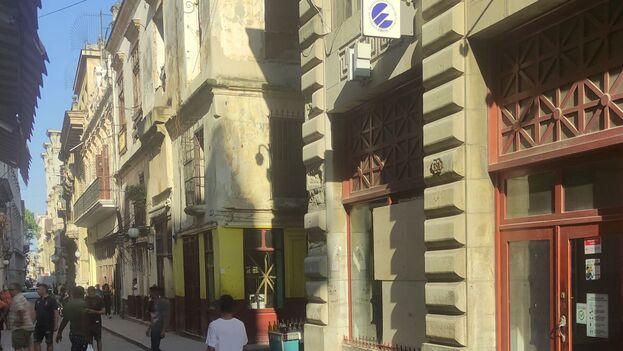
![]() 14ymedio, Yoani Sánchez, Havana, 12 September 2022 — “We have not reported any breakages in that area,” the customer service employee of the Cuban telecommunications monopoly, Etecsa, answers in a tired voice. It is the fifth time that I have called on the same day to complain because web browsing from my mobile does not work, but Etecsa only gives vague explanations: “Perhaps there is congestion on the network.” Almost four years after internet access on cell phones appeared on this island, staying connected is still a headache.
14ymedio, Yoani Sánchez, Havana, 12 September 2022 — “We have not reported any breakages in that area,” the customer service employee of the Cuban telecommunications monopoly, Etecsa, answers in a tired voice. It is the fifth time that I have called on the same day to complain because web browsing from my mobile does not work, but Etecsa only gives vague explanations: “Perhaps there is congestion on the network.” Almost four years after internet access on cell phones appeared on this island, staying connected is still a headache.
With more than seven million active mobile phone lines, and rates that allow Etecsa to pocket figures in the millions of dollars each month, anyone would assume that this state-owned company has engaged in a process of investments and improvements over the years that enhance the experience of its subscribers. However, instead of benefits and new functionalities, we Cubans have seen our connectivity to the great world wide web deteriorate in recent months. Like a crab, the Etecsa networks have gone backwards in stability and data transmission speed.
It should be clarified that the impairment of the service is not the same for everyone. In the editorial office of this newspaper, it happens, more and more frequently, that the 4G network that is working at five in the morning disappears by the time dawn arrives, leaving our mobile phones disconnected and practically useless for certain journalistic tasks. Coincidentally, the service is restored in the afternoon or at night, without any company operator knowing what answer to give us about the reasons for the interruption. Something similar happens to other independent journalists, activists and opponents in Cuba, but Etecsa does not respond – at all – to their rights as customers who pay for a service.
Since naivety is the first thing you lose when you live under totalitarianism, we went through those first speculations a long time ago: thinking that maybe it was a technical problem that affected the entire neighborhood; or an electrical storm that damaged the transmission tower of the closest phone line; or a blackout that left the company’s data servers useless. After inquiries and questions, we can only conclude that these difficulties we are experiencing are due to a political decision.
By the will of a regime that is allergic to the free flow of information, we Cubans must wade through a handicapped internet in which audiovisual files take forever to be published and a long hell to download. Significantly, these difficulties become greater when trying to access networks like Facebook, a platform that has become a wall of denunciations of Cuban citizens and the place where the first images of any popular protest that occurs on the island almost always appear.
“They knocked down the internet, surely they threw it into the street somewhere,” I heard a young woman say from a long line to buy bread several days ago. The woman was right. After several of us in line tried, to no avail, to check our email inbox or chat with a friend, we found out about the demonstration in El Cepem and the demands of a group of residents of that poor community of Artemisa that the police not suppress their attempt to leave the country. The logic of “there is no connection to the web, something must be happening that the ruling party wants to hide” hardens into a certainty with each “coincidence” between the data blackouts and the protest events.
As Etecsa does not respond and has zero transparency about what really happens, the customers of this telecommunications monopoly are left to speculate and connect the dots. We can conclude, for example, that since the popular protests of July 11, 2021 our access to the great world wide web is more precarious. We also assume that the regime’s recently announced agreements with Russia on information technology, along with those previously with China, are not to expand the frameworks of autonomy for Internet users, but rather the contrary.
Along with the censored sites, the mobile service cuts and the censorship of keywords in text-only messages (SMS), Etecsa has been adding layers and layers of new restrictions until leaving us with weighted-down and totally monitored access to the web. Probably inspired by the excesses of Beijing, the Cuban regime has been erecting its own great wall to filter the “pernicious” effects of the free flow of content and intends for this wall to reach a limit where we desist from using the networks as a virtual civic plaza.
While it was 14 years ago I started my blog Generation Y blog with an old laptop and, shortly after, I opened a Twitter account to which I sent blind messages by SMS, it will not be these ups and downs in connectivity that will prevent me from continuing to report on deep Cuba. But I fear that what today are outages and reductions in the quality of service for many Etecsa clients, tomorrow will be jails, beatings and convictions. It’s not about kilobytes, it’s about freedoms.
____________
COLLABORATE WITH OUR WORK: The 14ymedio team is committed to practicing serious journalism that reflects Cuba’s reality in all its depth. Thank you for joining us on this long journey. We invite you to continue supporting us by becoming a member of 14ymedio now. Together we can continue transforming journalism in Cuba.
